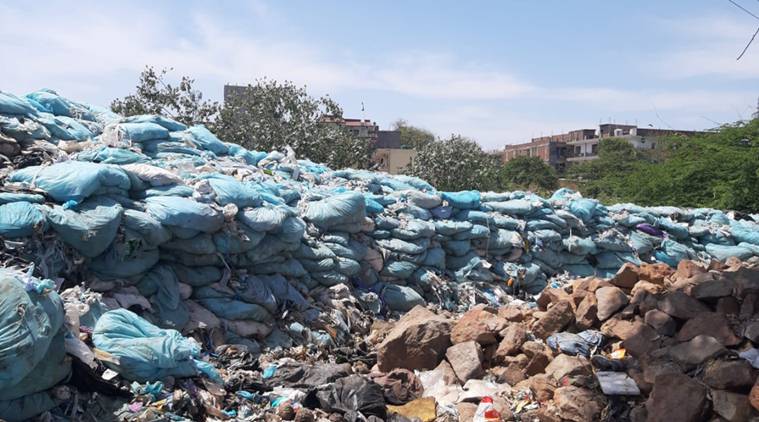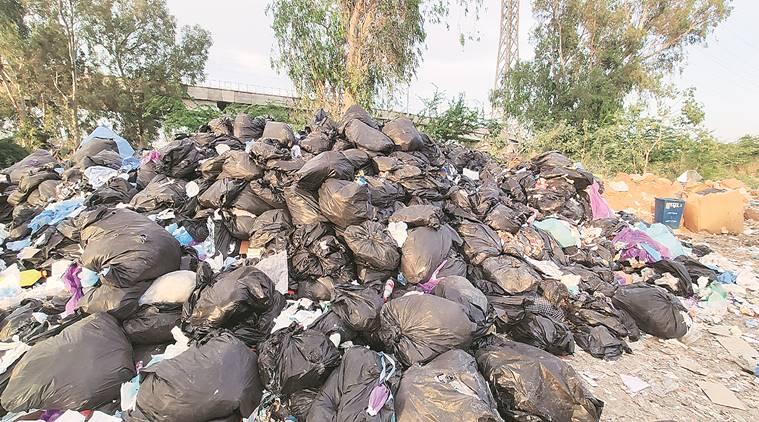- India
- International
At Kalindi Kunj Camp: Living amid medical waste, these refugees don’t fear virus, only hunger
The campsite, which The Indian Express visited Monday, was filled with rows and rows of medical waste — surgical masks, gloves and empty tablet packets, among other items — packed into sky blue bags.
 A heap of medical waste in blue bags at Sharan Vihar, New Delhi. Express Photo by Anand Mohan J
A heap of medical waste in blue bags at Sharan Vihar, New Delhi. Express Photo by Anand Mohan J
“The one who collects the maximum number of syringes wins the game,” shouted 11-year-old Irshad as he ran around Sharan Vihar camp’s Assamese quarters, carrying a plastic tray and filling it with discarded syringes. Two of his friends only managed to find some plastic bottle caps and parts of what used to be a drip feed, and gave up after a few minutes.
“I won the game today. We collect the syringes and play with them later. We do this every day,” said Irshad.
The Sharan Vihar campsite, located near Kalindi Kunj, houses several hundred Rohingya refugees in addition to migrants from Assam, West Bengal and Uttar Pradesh. Many at the camp work as medical waste collectors, going from hospital to hospital and bringing back waste to the campsite to segregate.
Read| Coronavirus India HIGHLIGHTS.
The campsite, which The Indian Express visited Monday, was filled with rows and rows of medical waste — surgical masks, gloves and empty tablet packets, among other items — packed into sky blue bags.
The shutdown in Delhi over the coronavirus pandemic has not just taken away their only source of livelihood, but residents are also at risk because they can’t dispose of the waste, which has been accumulating around their homes.
Most who work as medical waste collectors mainly reside in the Assamese quarters. One of them, Anwar Islam (39), said the last time he went to a local hospital to collect medical waste was a month ago. He said he “pays an authorised medical waste contractor to collect his quota from the hospital”.

It takes him over five hours to collect the waste, which his wife, Ashada Begum (37), then segregates for a whole day. A kilogram of plastic medical waste fetches them Rs 12.
Surrounded by a mountain of medical waste, their house is hard to find: Discarded face masks, tunics, gowns and caps jut out from the blue bags while a box of discarded injections lie near the entrance.
Cooking some rice and dal from the ration distributed a day ago, Begum said: “There has been no work in months. First, it was because of the Shaheen Bagh protest… now the lockdown. I don’t fear the disease, I fear my five children starving.”
“We have borrowed Rs 2,000 from camp residents. I don’t know how long we will survive,” she added.
 The camp is home to Rohingya and migrants from Assam, UP. Many work as medical waste collectors. (Express photo by Abhinav Saha)
The camp is home to Rohingya and migrants from Assam, UP. Many work as medical waste collectors. (Express photo by Abhinav Saha)
Further away, a dirt road littered with broken ampoules and empty tablet strips snakes its way around a mountain of medical waste, where Zaiful (36) stays with her three children in a one-room house.
Around 15 days ago, she segregated the medical waste and is now thinking of ways to sell it in Nangloi. “I know it is dangerous to work in these conditions. But we can’t even dispose of the waste now as police are not letting us leave the camp,” she said.
Her next-door neighbour Dilshad fumed when asked about coronavirus: “I have a mask that will help me. The garbage around my house does not scare me. The empty plate does.”
Dr Ashok Aggarwal from the Indian Society of Hospital Waste Management said hospital waste must be disposed of within 48 hours as the risk of infections from a wide range of diseases — from Hepatitis B to HIV — is high. “Private contractors are offered the contracts. The waste is disposed of in burial pits or incinerators after it is shredded,” he said.
When contacted, South MCD officials said they will examine the issue.
Must Read
Apr 19: Latest News
- 01
- 02
- 03
- 04
- 05






































